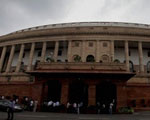|
 New Delhi: Petroleum and Natural Gas Minister M Veerappa Moily has expressed doubts over the amendment to the Right to Information Bill saying the timing may not be right, considering the poor perception about politicians, said sources. The amendment, aimed at keeping political parties out of the RTI ambit, is likely to be taken up by the Lok Sabha on Thursday. New Delhi: Petroleum and Natural Gas Minister M Veerappa Moily has expressed doubts over the amendment to the Right to Information Bill saying the timing may not be right, considering the poor perception about politicians, said sources. The amendment, aimed at keeping political parties out of the RTI ambit, is likely to be taken up by the Lok Sabha on Thursday.
The government and the Opposition seemed to be united on this issue and a Cabinet note said that as political parties are neither public bodies nor Constitutional bodies and they do not take government funds, hence should be kept out of the RTI loop.
Meanwhile, Biju Janata Dal leader Jay Panda is one of the few politicians who has come out strongly against the amedment to the RTI Bill. He said, "The system needs to become more transparent. There is a strong public demand that we need to make particularly the funding aspect more transparent. There are many countries which don't have political parties within the RTI ambit but they have other strong measures."He also said if political parties are claiming that they are not public bodies is "like saying sports associations are private bodies and both are wrong".
Parliamentary Affairs Minister Kamal Nath said, "As far as financial aspect is concerned, it is already in public domain. But if questions are asked on how political parties work, then it's a problem."
The Bill was introduced on August 12 in the Lower House by Minister of State for Personnel, Public Grievances and Pensions V Narayanasamy. The Union Cabinet had cleared the proposal to amend the Act to give immunity to political parties and negate a Central Information Commission order to this effect. Many RTI activists have opposed the proposed amendments.
The Cabinet's decision had come nearly two months after the Central Information Commission's order of bringing six national political parties, Congress, BJP, NCP, CPI-M, CPI and BSP, under the RTI Act.
The government has proposed an amendment in Section 2 of the Act, which defines public authority, to shield the political parties. The proposed amendments, if accepted by Parliament, will make it clear that the definition of public authority shall not include any political party registered under the Representation of the People Act, officials said.
The CIC had in its order on June 3 held that the six national parties have been substantially funded indirectly by the Central government and were required to appoint public information officers as they have the character of a public authority under the RTI Act. The order had evoked sharp reactions from political parties, especially the Congress which has been credited with bringing in the transparency law. Many RTI activists have opposed the proposed amendments.
Source: http://ibnlive.in.com
|



 New Delhi: Petroleum and Natural Gas Minister M Veerappa Moily has expressed doubts over the amendment to the Right to Information Bill saying the timing may not be right, considering the poor perception about politicians, said sources. The amendment, aimed at keeping political parties out of the RTI ambit, is likely to be taken up by the Lok Sabha on Thursday.
New Delhi: Petroleum and Natural Gas Minister M Veerappa Moily has expressed doubts over the amendment to the Right to Information Bill saying the timing may not be right, considering the poor perception about politicians, said sources. The amendment, aimed at keeping political parties out of the RTI ambit, is likely to be taken up by the Lok Sabha on Thursday.